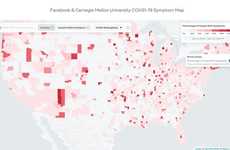
Mozilla and the Markup are Tracking Collected Data on Internet Users
Colin Smith — January 13, 2022 — Tech
References: themarkup.org & gizmodo
Mozilla, the company behind the popular web browser Firefox, has partnered up with the tech media company The Markup to ascertain exactly how much data tracking Meta, formerly known as Facebook, participates in.
Whether internet users have an account on Facebook or not, Meta collects information on internet surfers in order to deliver personalized advertisements and curated content. The most common way Meta achieves this task is through a 'Facebook Pixel' which is an individual pixel placed on any webpage that is connected to Meta's servers which allows it to monitor some activity of the computer user.
Mozilla has released an add-on for its Firefox browser named 'Mozilla Rally' which will collect the data that Meta collects and display it only to Mozilla and certain journalists at The Markup, who are bound to journalistic integrity. The purpose of this project is to determine the exact depth of info collected by Meta.
Image Credit: Shutterstock
Whether internet users have an account on Facebook or not, Meta collects information on internet surfers in order to deliver personalized advertisements and curated content. The most common way Meta achieves this task is through a 'Facebook Pixel' which is an individual pixel placed on any webpage that is connected to Meta's servers which allows it to monitor some activity of the computer user.
Mozilla has released an add-on for its Firefox browser named 'Mozilla Rally' which will collect the data that Meta collects and display it only to Mozilla and certain journalists at The Markup, who are bound to journalistic integrity. The purpose of this project is to determine the exact depth of info collected by Meta.
Image Credit: Shutterstock
Trend Themes
1. Privacy Browsers - Creating web browsers that prioritize user privacy by blocking data collection and tracking could disrupt the current ad-based economic model of many websites.
2. Data Transparency - Developing tools and technologies that allow for greater transparency in data collection practices and ownership could help build trust with consumers and lead to more ethical data usage in industries like marketing and advertising.
3. Journalistic Integrity Platforms - Building platforms that enable independent journalists and media companies to access unbiased data analysis could transform the media landscape and provide more accountable reporting on important issues.
Industry Implications
1. Web Browsers - Web browser companies that can provide superior user privacy features like blocking data tracking could capture market share from established companies and disrupt the status quo.
2. Marketing and Advertising - Companies that can demonstrate ethical data collection practices and offer greater transparency to their customers could build a loyal customer base and potentially outcompete those that prioritize profits over privacy.
3. Media and Journalism - Platforms that offer unbiased data analysis and insights to independent journalists and media organizations could transform the industry and enable reporting on important issues without reliance on corporate interests.
2.1
Score
Popularity
Activity
Freshness






















